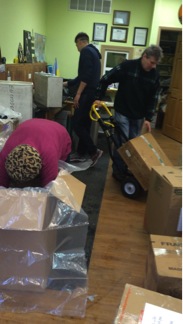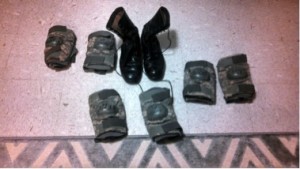Nearly every weekend a team of Ukrainian-Americans sets out from Chicago in a light blue Dodge Caravan minivan to collect military items from U.S. soldiers at bases across the country for shipment to Ukrainian forces fighting Russian-backed separatists.
During trips to bases in Missouri, Georgia, Kansas, North Carolina and Kentucky they have gathered what they describe as “non-lethal” military supplies from individual soldiers, including first aid kits and combat jackets.
The 30,000-strong Ukrainian community in Illinois has rallied to help its brethren because they feel the United States has abandoned Ukraine as it faces a war with Russian separatists in the east of the country.

“Bob,” a Ukrainian American man who collects and sends aid to Ukraine, displays a sniper spotting scope destined for forces on the ground in Ukraine. (Taylor Hall/Medill)
NATO says Russia is fomenting the war by supplying military equipment, volunteers, training and perhaps soldiers to help the separatists, a charge that President Vladimir Putin denies. More than 5,400 people have died and nearly one million displaced in the fighting since April 2014, according to the United Nations.
The United States is sympathetic to Ukraine and is sending financial and humanitarian aid to the Kiev government and President Barack Obama has said he is considering sending lethal weapons to Ukraine to defend itself. A ceasefire was declared on Feb. 15 but fighting has continued amid doubts the agreement will be honored.
“The American community’s not gonna do anything,” said “Bob,” one of the Ukrainian-Americans who is gathering military equipment, who asked that we use only his first name because he was concerned about scrutiny from U.S. authorities. “Ukraine’s basically on its own. It’s fighting this whole war by itself.”
One recent weekend, Bob’s team set out in the minivan for Fort Leonard Wood Army base near Waynesville, Missouri, not even bothering to remove the car seats used during the week for their small children. They returned with 25 pairs of elbow pads and 100 individual first aid kits, which Bob said will be split up and sent to 10 different regions of Ukraine.
In a typical transaction, a soldier will be in communication with Bob or his team in advance of the trip to arrange the delivery. The team will drive down on the weekends to meet the soldier on an off day outside the military base, where they will purchase the equipment from the soldier, negotiating on price.
Bob estimates he ships 120 pounds of supplies to Ukraine each week. He and his group began making shipments in December 2013, but have taken a “more active approach” since August 2014.
“It’s not illegal,” he said. “And we have no choice because they’re dying. Our guys are dying.”
A spokesman from Fort Leonard Wood military base did not respond to a reporter’s repeated calls asking about the legality of acquiring military supplies from active duty soldiers.

Residents of Ukrainian Village in Chicago help load packages of military equipment, first aid and other supplies at Meest-Karpaty Inc.’s Chicago location. (Taylor Hall/Medill)
Thomas McCollum, a spokesman for Fort Bragg, North Carolina, one of the other military bases Bob’s team has visited, said soldiers are not permitted to sell any property of the U.S. Army issued to them while active-duty. Once a soldier has been discharged, items such as boots, headgear and underwear do not have to be returned, according to Army regulations. But medical equipment such as first aid kits do not become the soldier’s personal property after discharge, McCollum said.
Soldiers selling items illegally could face dishonorable discharge, forfeit pay, face a financial penalty, or be jailed for up to 10 years, according to U.S. law.
Bob also purchases military gear for Ukraine from military surplus auction websites, including a Barska 20-60 x 60 sniper spotting scope. Another Chicago émigré group, Chicago Automaidan, named after the Ukrainian activist movement, posted receipts for their online purchases towards “much needed supplies and goods for the troops defending Ukraine’s Independence” on their public Facebook page.
Receipts for the group’s purchases from December 2014 show nearly $8,000 in items including a “Phantom 2 Quadcopter Drone with Integrated FPV camera” and a “tactical folding knife.” Other items included face masks, combat boots, military first aid kits, and camouflage jackets, purchased from websites.
Military surplus items may be legally sold online as long as they are not property of the U.S. military at the time of sale, according to Army Regulations. But such military surplus websites have faced scrutiny for how easy they make it to procure defense-related equipment.

Elbow pads and pair of boots purchased from a soldier at Fort Leonard Wood Army base in Missouri, destined for the battlefields of Ukraine. (Photo taken Feb. 8 by Bob, a Ukrainian man who purchases and ships the items to Ukraine.)
An April 2008 Government Accountability Office (GAO) report said it found numerous defense-related items for sale to the highest bidder, and that a review of policies and procedures of the websites revealed few safeguards to prevent the sale of sensitive and stolen defense-related items using the sites.
Earlier this month, seven Bosnian natives living in Illinois, Missouri and New York were charged in a federal indictment with purchasing U.S. military uniforms, firearms accessories and tactical gear from online surplus stores and shipping it to intermediaries in Turkey and Saudi Arabia who forwarded the supplies to ISIS fighters in Syria and Iraq.
Bob and his team, Chicago Automaidan, and some other groups ship items to Ukraine through Meest-Karpaty, an independent international shipping company located in Chicago’s Ukrainian Village that specializes in delivering parcels to Eastern Europe. Meest-Karpaty offers free and reduced-rate shipping on all parcels going to Ukraine, according to Meest-Karpaty manager Maria Buchwak-Iwnec.
Bob and Chicago Automaidan founder Michael Glebiv said they did not need export licenses for any of the items they ship to Ukraine. Meest-Karpaty manager Buchwak-Iwnec said she does not ship weapons or anything illegal.
An official with the U.S. State Department office that administers military export law declined to comment on whether the items being shipped by the Ukrainian-Americans require export licenses. According to a guide posted on its website, anyone who has questions about an item must register with the office.
Failure to secure export licenses for items that are controlled could lead to criminal charges or at least a financial penalty said Peter Quinter, who chairs the Customs & International Trade Law Group of Gray Robinson, P.A.
“We’re sending humanitarian aid,” Bob said. “And if it kills the Russians, good for us.”

Meest-Karpaty Inc., an independent shipping company located in Chicago’s Ukrainian Village, ships military equipment to Ukraine for free and reduced rates. (Taylor Hall/Medill)





